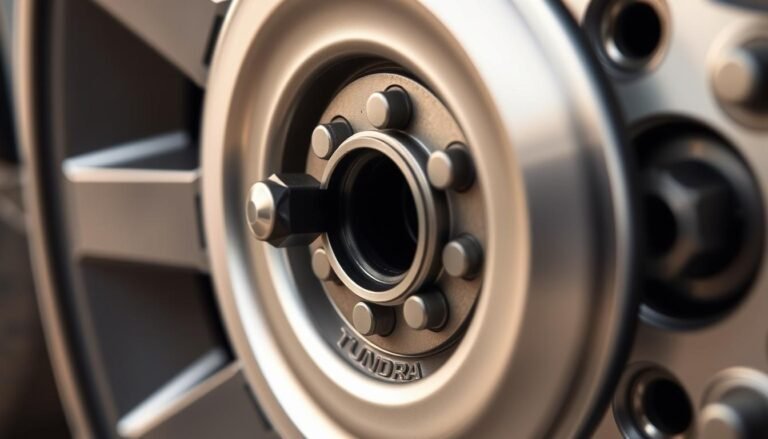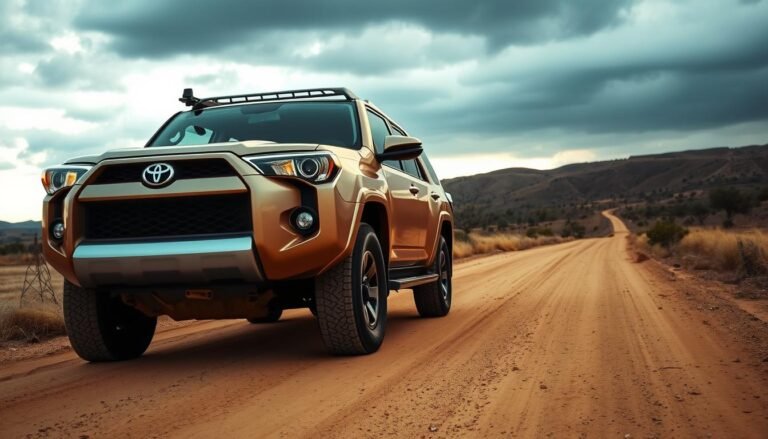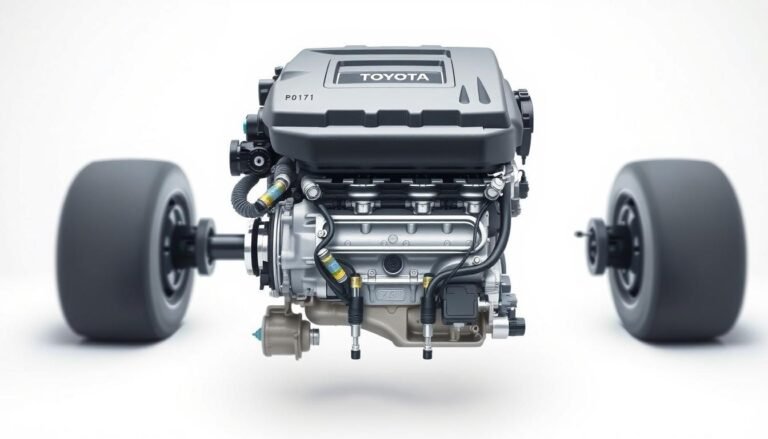Toyota 4Runner Gas Mileage – MPG Guide & Tips
Wondering about Toyota 4Runner gas mileage? It gets 16 to 19 miles per gallon. This varies by how you drive and the model you have.
If you love the 4Runner’s tough look and dependability, knowing its MPG can help during your travels.
In this MPG guide, get tips to use less fuel and save on gas station visits. You’ll find ways to drive smarter and keep your 4Runner running efficiently.
We offer advice on care, upkeep, and simple changes for better fuel use. This guide explains how engine performance, the car’s weight, and tire pressure influence your gas mileage.
With these insights, you can make your Toyota 4Runner more fuel-efficient. Ready to use less gas and enjoy your 4Runner more? Let’s improve your MPG together!
What is Toyota 4Runner Gas Mileage?
Knowing your Toyota 4Runner’s gas mileage is key for your budget and the planet. It shows how many miles per gallon (MPG) your SUV gets.
This lets you manage fuel use well. Your 4Runner’s gas mileage depends on the engine, how you drive, and how well you keep it up.
Seeing how your 4Runner uses fuel is more than just numbers. It tells you when the car needs a check-up or if your driving habits need to change.
Things like tire pressure and overall car health affect how much gas you use. By keeping an eye on these, you can use less fuel.
Learning all about your 4Runner’s gas mileage helps you save cash and energy. Knowing exactly how your car does with fuel makes driving more efficient and less costly.
2024 Toyota 4Runner Gas Mileage Breakdown
The 2024 Toyota 4Runner has impressive gas mileage that could change how you drive. Knowing the difference between city and highway mileage is key for saving gas.
This section provides details on the 4Runner’s fuel economy, useful for anyone thinking of buying or who already owns one.
City vs. Highway MPG
In the city, the 2024 Toyota 4Runner gets about 16 mpg. This is due to stops and starts in traffic and idling.
On highways, it does better, with up to 19 mpg. This shows the 4Runner uses fuel more efficiently on longer drives.
Different Trims and Their MPG Ratings
The 2024 Toyota 4Runner’s trim level affects its gas mileage. Each trim comes with features and tech that change how much fuel it uses.
Here’s a look at mpg by trim:
| Trim Level | City MPG | Highway MPG |
|---|---|---|
| Base Trim | 16 | 19 |
| TRD Off-Road | 16 | 19 |
| Limited Trim | 16 | 19 |
Knowing the mpg for each trim helps you pick the right one for your needs, whether for daily drives or adventures.

Factors Influencing Fuel Efficiency in The Toyota 4Runner
Fuel efficiency in the Toyota 4Runner depends on several things. These include how the engine runs, how much the vehicle weighs, its shape, and the tires it uses.
Knowing about these things helps you drive better. It also helps you make smart choices when you take care of your car or improve it.
Engine Performance
The 2024 Toyota 4Runner comes with a strong 4.0L V6 engine. This engine is great for driving off-road.
But, the power it provides can affect how much fuel your car uses. For example, if you speed up fast or pull something heavy, your car uses more fuel.
Weight and Aerodynamics
The Toyota 4Runner’s weight also plays a role in how it uses fuel. Heavier cars need more power to go fast, which can use more fuel. The car’s shape is important too.
A bulky design can slow you down because of wind resistance. A shape that cuts through the air better can save you fuel, especially at high speeds.
Tire Pressure and Type
Having the right tire pressure is important for saving fuel. When tires are not pumped up enough, they drag more, which can make you use more fuel.
Also, the type of tires you choose matters. Some tires are made to save fuel by balancing how well they grip and how much fuel they use.
Checking your tire pressure often helps your car run better.

| FactorImpact on Fuel Efficiency | |
|---|---|
| Engine Performance | Power demands can lead to higher fuel consumption |
| Weight | Heavier vehicles require more energy for acceleration |
| Aerodynamics | Increased wind resistance reduces efficiency |
| Tire Pressure | Under-inflation increases rolling resistance |
| Tire Type | Energy-efficient tires help maintain fuel efficiency |
Tips For Improving Gas Mileage in a Toyota 4Runner
To improve gas mileage in your Toyota 4Runner, combine good maintenance with smart driving. By doing these, you can really make your fuel go further.
Regular Maintenance Practices
For your Toyota 4Runner to run well, it needs regular check-ups. Changing oil and air filters regularly is very important for the engine.
A well-cared-for car uses less gas and gets better mileage. Here’s what to do regularly:
- Change the oil every 5,000 to 7,500 miles.
- Replace the air filter every 15,000 to 30,000 miles.
- Check the spark plugs and replace them if necessary.
- Keep tires properly inflated according to the maker’s guide.
- Check and service brakes often.
Driving Habits That Affect MPG
How you drive really affects your gas mileage. By driving more carefully, you can save a lot of fuel. Try these tips for better efficiency:
- Accelerate slowly and avoid speeding up quickly.
- Keep a constant speed, and use cruise control on the freeway when you can.
- Don’t idle for too long; turn off the car if you’re waiting.
- Avoid sudden stops by looking ahead for traffic.
Use of Eco-Driving Techniques
Using eco-driving techniques helps your Toyota 4Runner’s gas mileage. These tips can also make your vehicle last longer. Give these methods a shot:
- Use the car’s eco mode if it has one.
- Try not to use heating and air conditioning too much.
- Avoid carrying extra weight in the car.
- Plan your trips to avoid heavy traffic.
Maximizing Fuel Efficiency in Toyota 4Runner
To drive your Toyota 4Runner efficiently, know the best speed for gas mileage. Keeping a steady speed helps save gas. Focus on the right speed and use the car’s drive modes.
Optimal Speed For Best Gas Mileage
The best speed for a Toyota 4Runner is between 45 to 65 mph. This balance gives you power without wasting fuel.
Going faster increases air resistance, which uses more gas. Staying in this speed range is key to saving on fuel costs.
Utilizing Drive Modes Effectively
Modern Toyota 4Runners have different drive modes for various conditions. Using eco-friendly mode helps save fuel by adjusting the car’s settings. Learn these settings to drive more efficiently and save gas.

Comparing Toyota 4Runner To Other SUVs in Terms of Fuel Economy
The Toyota 4Runner shines on rough terrains but might not win the fuel economy race. It stands out for being tough and flexible. But, in terms of gas mileage, it’s not the leader.
For those looking at fuel efficiency, the Honda CR-V and Toyota RAV4 are better picks. They offer higher fuel economy numbers.
Best Gas Mileage SUVs in The Market
When searching for fuel-efficient SUVs, these models impress with their gas mileage:
- Honda CR-V: Offers remarkable fuel savings while providing spacious interiors and advanced technology.
- Toyota RAV4: Balances performance and efficiency, making it a popular choice among drivers seeking lower fuel costs.
- Hyundai Tucson: Provides a comfortable ride with excellent MPG ratings, appealing to those who prioritize economy without sacrificing style.
- Subaru Crosstrek: Combines versatility and higher gas mileage, suitable for both urban and adventurous journeys.
How The 4Runner Stacks Up Against Competitors?
In MPG ratings, the Toyota 4Runner doesn’t quite match up to these fuel-efficient SUVs. It’s more for those into off-roading than saving on gas.
Here’s how they compare:
| SUV Model | City MPG | Highway MPG |
|---|---|---|
| Toyota 4Runner | 16 | 19 |
| Honda CR-V | 28 | 34 |
| Toyota RAV4 | 27 | 35 |
| Hyundai Tucson | 23 | 28 |
| Subaru Crosstrek | 28 | 33 |
Choosing an SUV? Think about fuel efficiency. It greatly affects your costs. This comparison helps you find what fits your needs best.

Toyota 4Runner Fuel Consumption in Real-World Scenarios
Toyota 4Runner owner MPG reports show a wide range of experiences. These differ from the official ratings. People talk about their fuel efficiency on forums.
They explain how real life can be different than expected. Things like driving habits, terrain, and climate affect their fuel use.
Owner Experiences and Reporting MPG
Users often find their real-world MPG doesn’t match up with what’s advertised. For example, city dwellers see lower MPG due to frequent stops and starts.
But on highways, the 4Runner does better and shows its efficiency over long trips. Here’s what some owners say:
- Highway trips averaging 20-23 MPG.
- City driving ranges closer to 15-18 MPG.
- MPG drops when towing or the car is fully loaded.
Driving Conditions Impacting Mileage
Many factors influence fuel efficiency. Toyota 4Runner owner MPG reports point out how the landscape can change mileage.
Driving up hills, for example, requires more power and uses more fuel. Other factors include:
- Cold weather makes the engine work harder.
- Keeping the right tire pressure can help save fuel.
- How you drive, like quick starts and stops, can lower MPG.
Exploring Eco-Friendly Driving with Toyota 4Runner
The 2024 Toyota 4Runner offers eco-driving features to make your drive smoother and the planet healthier.
Knowing how to use these features is key for anyone wanting to drive in a more eco-friendly way.
For example, the Eco Mode adjusts how the engine works. This helps use less fuel and cuts down on pollution.
Eco-Driving Features in The 4Runner
The Toyota 4Runner uses technology to save on fuel. Here’s a look at what it offers:
- Eco Mode: This feature tweaks engine action and air conditioning for better efficiency.
- Efficient Transmission System: This automatic transmission works better and saves fuel.
- Onboard Fuel Economy Monitoring: It gives feedback on your driving, helping you use less gas.
Impact of Fuel Choice on Emissions
Using the right fuel is crucial for the Toyota 4Runner’s impact on the environment. Better fuels mean cleaner burning, which lowers pollution.
Sticking to recommended fuels ensures the vehicle stays eco-friendly.
Toyota 4Runner and Long Road Trips: Fuel Considerations
When you’re planning a road trip in your Toyota 4Runner, it’s smart to think about fuel. You need to figure out where you’ll stop for gas.
This takes into account how far your 4Runner can go on a full tank, about 400 miles, and its 23-gallon tank size.
Planning ahead helps you avoid running out of gas, especially where there aren’t many gas stations.
Planning For Fuel Stops
Finding the best spots for fuel stops is key, especially in remote areas. You can:
- Use apps or websites to find gas stations on your path.
- Adjust how often you stop for gas based on how you drive.
- Monitor your 4Runner’s fuel gauge to prevent running low on fuel.
Strategies For Road Trip Efficiency
To use less fuel on your road trip, try these tips:
- Drive at consistent speeds to use fuel more efficiently.
- Skip fast takeoffs and avoid idling when you can.
- Pick roads that keep you moving instead of stuck in traffic.
Following these tips can help you use fuel better and enjoy your trip in the Toyota 4Runner more.
Toyota 4Runner Gas Mileage: Recommendations For Buyers
If you’re thinking about buying a Toyota 4Runner, consider how you’ll use it. It’s important to know the gas mileage because it can affect your decision.
For example, if you drive a lot in the city or take many long trips, a smaller SUV or a hybrid might be better for you. They usually use less fuel.
Things To Consider Before Buying
- Assess your driving patterns: Determine if most of your driving occurs in the city or on the highway.
- Evaluate alternative vehicles: Research smaller SUVs or hybrids to compare fuel economy ratings.
- Consider long-term costs: Calculate potential fuel expenses based on the 4Runner’s MPG to understand total ownership costs.
Fuel Economy as a Factor in Purchase Decisions
Fuel economy is important when choosing a car. Knowing the 4Runner’s fuel use can help you know what to expect.
If saving money and caring for the environment are important to you, consider fuel efficiency. It affects both your wallet and the planet.
| Model Year | City MPG | Highway MPG | Combined MPG |
|---|---|---|---|
| 2023 | 16 | 19 | 17 |
| 2022 | 16 | 19 | 17 |
| 2021 | 16 | 19 | 17 |
Conclusion
The Toyota 4Runner’s gas mileage is key for those who own it or think about buying. Although its MPG might not beat some smaller SUVs, its strength and features stand out.
This makes it great for folks who love adventures and need a reliable car. To make your 4Runner work its best, keep it well-maintained and drive wisely.
Taking good care of your car and driving smart can help save on gas. This way, you get the most from your 4Runner without spending too much on fuel.
Lastly, knowing how the 4Runner uses fuel is crucial for making smart choices about owning or buying one.
With the right knowledge, you can use your 4Runner to its fullest on every trip.
FAQs
What is the gas mileage for the 2024 Toyota 4Runner?
The 2024 Toyota 4Runner gets up to 16 MPG in the city. On the highway, it gets up to 19 MPG.
How can I improve gas mileage in my Toyota 4Runner?
For better gas mileage, keep up with regular checks and use eco-driving habits. Also, drive steadily between 45-65 mph.
Does driving style affect the Toyota 4Runner MPG?
Yes, how you drive affects your Toyota 4Runner’s fuel use. Steady driving and smooth acceleration help a lot.
What eco-driving features are available for the Toyota 4Runner?
The 2024 Toyota 4Runner has an Eco Mode. It helps use less fuel, making driving more efficient.
How does the 4Runner compare to other SUVs in terms of fuel economy?
The Toyota 4Runner does well off-road. But it’s not the top for saving fuel. SUVs like the Honda CR-V and Toyota RAV4 are better on gas.
What factors influence fuel efficiency in the Toyota 4Runner?
Fuel efficiency depends on engine type, how heavy the vehicle is, its shape, and the tires’ pressure and type.
What should I consider when buying a Toyota 4Runner regarding gas mileage?
Think about how much you’ll be driving in the city. Remember, the 4Runner’s gas mileage is something to consider.
How can I calculate fuel stops for a road trip in my Toyota 4Runner?
The 4Runner’s tank holds about 23 gallons, with a city MPG of 16. You can go nearly 400 miles before needing gas.







